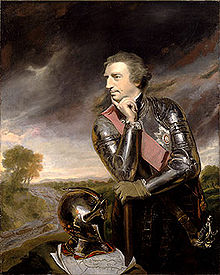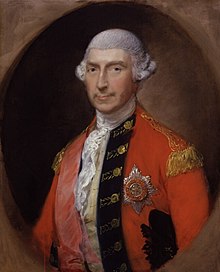Jeffrey Amherst, 1st Baron Amherst

Jeffrey Amherst, 1st Baron Amherst (born January 29, 1717 in Sevenoaks , England , † August 3, 1797 ibid) was a British field marshal , military governor of Canada , governor of the Colony of Virginia and commander in chief of the British Army .
Life
Jeffrey Amherst joined the British Army as Ensign in 1731 and took part in the War of the Austrian Succession (1740-1748). He fought in the battles of Dettingen and Fontenoy and temporarily held the position of adjutant to the future Commander in Chief of the British Army, General John Ligonier .
In the Seven Years' War (1756–1763) he fought under the command of the Duke of Cumberland in Germany, a. a. in the battle of Hastenbeck . Then in 1758, on Ligonier's recommendation, he was sent to America by Prime Minister William Pitt - where this conflict is referred to as the French and Indian War - and, to his complete surprise and over the heads of numerous other officers, to commander a against the French fortress Louisbourg on the Cape -Breton Island sent army promoted.
After their surrender he was promoted to Commander in Chief of the British Armed Forces in Canada, commanded an advance up Lake Champlain in 1759 to support the siege of Québec commanded by James Wolfes , drove the French from Fort Ticonderoga and forced the garrison on September 8, 1760 of Montreal to the surrender, with which the French rule in Canada de facto ended. From 1760 until the unsuccessful suppression of the Pontiac uprising in 1763, Amherst was military governor of Canada. After a brief return to England, he was celebrated as the "Conqueror of Canada" and in the same year was appointed governor of the colony of Virginia and in 1770 of Guernsey . In 1761 he was knighted as Knight Companion of the Order of the Bath .
Amherst was in 1776 as Baron Amherst , of Holmesdale in the County of Kent , to peer collected. During the American Revolutionary War , he turned down a field command because he had close relationships with numerous personalities on the other side. In 1778 he was given the command of the British Army, and in the same year the rank of field marshal . In 1788 Amherst was raised again to Baron Amherst, of Montreal in the County of Kent , but now with a special succession plan in favor of his nephew, as he himself did not have a male heir to the title. In 1797 he died on his country estate in Sevenoaks.
meaning
As an officer, Amherst lacked the brilliance of his comrade-in-arms Wolfe . He was characterized by careful planning and a methodical, cautious approach to his operations.
Named after him were u. a. the cities of Amherst in the US state of New York and Amherst in the state of Massachusetts and Amherstburg in the Canadian Ontario . His nephew and title heir William Pitt Amherst (1773-1857) was an English diplomat and statesman.
Amherst's Genocidal Attitude towards Indians
Amherst achieved dubious fame for his attitude towards the Indians. Most famous of all, Amherst agreed to Colonel Henry Bouquet's plan to distribute smallpox- infected blankets to the rebellious Indians during the Pontiac Uprising . In fact, there is at least one recorded case in which Indians were "given" two blankets and a handkerchief from a smallpox hospital. However, it is unclear whether the action took place with knowledge or even at Amherst's behest: While the blankets and the handkerchief were issued on May 24, 1763, the letter in which Amherst recommends smallpox infection is from July 16 of that year. It is also not certain whether an infection through appropriate blankets and handkerchiefs was possible or actually occurred.
In addition, Amherst repeatedly spoke out in letters in favor of exterminating the Indians (July 9, August 7 and August 27, 1763). For this, he declared in the letter of July 16, already mentioned, any means would be appropriate. This attitude differs sharply from Amherst's attitude and behavior towards the French he also opposed: he was known for his chivalrous behavior towards the French and was benevolent towards their civilians. Amherst showed himself to be a typical representative of his contemporaries, the majority of whom regarded the Indians as uncivilized barbarians against whom the otherwise common rules of civilized warfare had no validity.
literature
- Amherst, Jeffrey Amherst, Baron . In: Encyclopædia Britannica . 11th edition. tape 1 : A-Androphagi . London 1910, p. 852 (English, full text [ Wikisource ]).
Web links
Individual evidence
- ^ The London Gazette : No. 10094, p. 2 , April 7, 1761.
- ↑ a b Peter d'Errico: Jeffrey Amherst and Smallpox Blankets . nativeweb.org (English), accessed September 17, 2007
| predecessor | Office | successor |
|---|---|---|
| Henry Seymour Conway |
Commander in Chief of the British Army 1783–1795 |
Frederick Augustus, Duke of York and Albany |
| New title created |
Baron Amherst of Holmesdale 1776-1797 |
Title expired |
| New title created |
Baron Amherst of Montreal 1788–1797 |
William Pitt Amherst |
| personal data | |
|---|---|
| SURNAME | Amherst, Jeffrey, 1st Baron Amherst |
| ALTERNATIVE NAMES | Jeffrey Amherst, 1st Baron Amherst of Holmesdale |
| BRIEF DESCRIPTION | British general |
| DATE OF BIRTH | January 29, 1717 |
| PLACE OF BIRTH | Sevenoaks , England |
| DATE OF DEATH | August 3, 1797 |
| Place of death | Sevenoaks , England |
